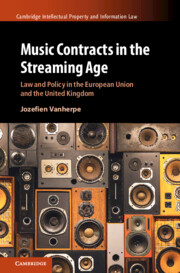Book contents
- Music Contracts in the Streaming Age
- Cambridge Intellectual Property and Information Law
- Music Contracts in the Streaming Age
- Copyright page
- Contents
- Figures and Tables
- Acknowledgements
- Abbreviations
- 1 Prelude
- 2 The Music Industry in the Streaming Age
- 3 Law and Policy in the Streaming Age
- 4 Negotiation and Formation of the Contract
- 5 Performance of the Contract
- 6 Termination of the Contract
- 7 Application of the Legal Framework in Practice
- 8 Conclusions
- Select Bibliography
- Index
- Cambridge Intellectual Property and Information Law
5 - Performance of the Contract
Published online by Cambridge University Press: 09 January 2025
- Music Contracts in the Streaming Age
- Cambridge Intellectual Property and Information Law
- Music Contracts in the Streaming Age
- Copyright page
- Contents
- Figures and Tables
- Acknowledgements
- Abbreviations
- 1 Prelude
- 2 The Music Industry in the Streaming Age
- 3 Law and Policy in the Streaming Age
- 4 Negotiation and Formation of the Contract
- 5 Performance of the Contract
- 6 Termination of the Contract
- 7 Application of the Legal Framework in Practice
- 8 Conclusions
- Select Bibliography
- Index
- Cambridge Intellectual Property and Information Law
Summary
The difference in the relative bargaining power of musicians and their corporate partners not only has consequences for the negotiation and formation phase of the contract, but also for its performance, consisting of the exploitation of protected content and the ensuing remuneration. Unfair situations may arise in both respects. This chapter analyses to what extent the legal framework intervenes – and should intervene. First, it reviews exploitation obligations, both in terms of the existence and scope of a duty to exploit and the possible limitations to the content of exploitation activities. Subsequently, the requirement of ‘fair’ remuneration, the available tools for ex post contract adjustment and legislative measures seeking to enhance transparency in the music value chain are scrutinised. The chapter then moves on the performance stage of contracts in secondary relationships, before making a case for a harmonised residual remuneration right for digital exploitation, and concluding.
Keywords
Information
- Type
- Chapter
- Information
- Music Contracts in the Streaming AgeLaw and Policy in the European Union and the United Kingdom, pp. 166 - 269Publisher: Cambridge University PressPrint publication year: 2025
